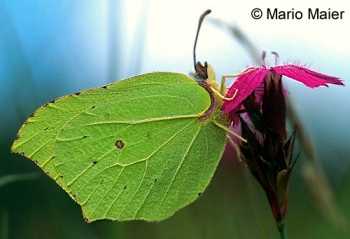 Articles...
Articles... 
Butterfly Etymology
The etymology (not entomology, which is the study of insects but etymology, the study of word origins) of the many words that have been used to describe the diurnal-flying Lepidoptera is fascinating. As author and etymologist David Feldman once asked, "who put the butter in butterfly?" The English common name may have originated from the relatively simple combination of "butter" and "fly," there's a written old English citation for buttorfleoge, but the literal origin is lost. Some sources have erroneously suggested that the excrement of butterflies is thought to resemble butter. The problem with this, of course, is that other than to void excess water, butterflies do not excrete!
Caterpillars do because they are the active growing stage, although a simple consideration of what they eat will make you wonder why anyone would consider that it, commonly called frass, resembled butter! Intriguingly, the larvae of the Jamaican Mexican Fritillary, Euptoieta hegesia hegesia (Nymphalidae), when fed exclusively on the yellow flowers of their preferred host plant, Turnera ulmifolia (Turneraceae), do excrete yellow frass! When a butterfly emerges from its chrysalis it voids its last larval meal and the waste byproducts of metamorphosis in meconium, a fluid that is most often blood colored (which would lead one to "bloodfly" not "butterfly").
 More likely origins include considering the that males of the common brimstone butterfly (Gonepteryx rhamni, Pieridae) of England, shown at left, are butter-colored, or that, as author Samuel Jackson suggested, butterflies and the churning of butter are the simultaneous harbingers of spring, or that the word derives from the old myth that witches and fairies stole butter in the night, in the form of butterflies. The first of these is probably the most likely explanation (I'm a firm believer in simple explanations) but there is some etymological evidence for the last.
More likely origins include considering the that males of the common brimstone butterfly (Gonepteryx rhamni, Pieridae) of England, shown at left, are butter-colored, or that, as author Samuel Jackson suggested, butterflies and the churning of butter are the simultaneous harbingers of spring, or that the word derives from the old myth that witches and fairies stole butter in the night, in the form of butterflies. The first of these is probably the most likely explanation (I'm a firm believer in simple explanations) but there is some etymological evidence for the last.
Regardless, the word – at least in English – is unique (see What's in a Name (or click the "Next" button below) for more information) although I find that it has posed some interesting problems. Think about this: its common to call birdwatchers "birders" but what would one call a butterflywatcher? A butterflier? I don't think so. It sounds too much like a food fight to me. And I can't say I'm particularly enamored of the alternatives, lepper or bugger, either! Any suggestions?


